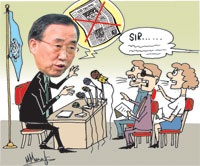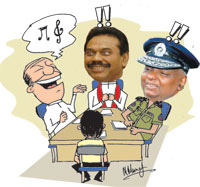The Interpress Service (IPS), United Nations Bureau Chief Thalif Deen was among a select group of UN correspondents invited for a luncheon meeting with Secretary-General Ban Ki-moon.
The invitation to IPS came despite a critical story on how the embattled Secretary-General had launched a charm offensive to win over a mostly negative UN press corps.
The five journalists invited for lunch (Western, not Korean cuisine) were told in advance that no questions, however politically sensitive, would be barred from what turned out to be a lively discussion with Ban, including his plans whether or not to run for a second term, his behind-the-scenes negotiations to resolve knotty international problems and his reluctance to indulge in megaphone diplomacy.
However, his responses, unfortunately, were strictly off-the-record and not-for circulation. The discussions also turned out to be an occasion to probe the Secretary-General's mind.
As the luncheon ended, one of the journalists asked Ban, amidst laughter, "So, when do we meet next?"
Full marks for president's PR
When it comes to public relations, President Mahinda Rajapaksa, is far better than other local politicians.
When he arrived at the residence of the late Dharmadasa Banda in Bibile for his funeral, Mr. Rajapaksa saw UNP General Secretary, Tissa Attanayake there.
He beckoned him to sit in a chair next to him. He asked Tissa Attanayake how he managed to maintain his youth (tharunakama). Tissa laughed and a conversation ensued.
The President referred to news reports with pictures which spoke of UNP leader, Ranil Wickremesinghe, pouring a pot of water on himself instead of on a deity at a temple ceremony. He asked whether it was true.
"Eka computer jilmaart," (or mischievously manipulated with the help of a computer,") replied Attanayake. "Yes, I also think so. In the photograph, there appeared to be more water than what the pot could contain," said President Rajapaksa.
The term jilmaart came into focus after the presidential election in January where some opposition members alleged that there was a "computer Jilmaat" in the results.
President Rajapaksa also told the UNP General Secretary that one of the party's MP's, Rosie Senanayake was seeking a meeting with him. It was over the amendment of local election laws. The President said instead of him, Ms. Senanayake should get in touch with his party.
On mark or off the mark?
The military defeat of Tiger guerrillas in May last year continues to echo in US military establishments.
"Understanding Sri Lanka's Defeat of the Tamil Tiger," was the title of an article written by US Army Major Neil Smith in the publication Joint Force Quarterly. He had referred to the military campaign of the security forces as "counter insurgency" operations.
Those remarks have drawn a sharp retort to the magazine from Edward Marks, a one time deputy head of mission in the US Embassy in Colombo. Marks now lectures on military and diplomatic matters, among others, to the US Pacific Command in Hawaii.
Marks said "Potentially the most serious misunderstanding in the author's attempt to put the Sri Lankan conflict into a COIN (counter insurgency) context. As far back as mid-1980s, the LTTE controlled territory, administratively as well as militarily. Therefore, the central conflict - or "center of gravity" to use a term popular in American military circles - was much more of a civil war between two territorially defined combatants, not "counter-insurgency" against guerrillas.
"The Sri Lanka Government's final victory was not a COIN success but a fairly classic kinetic campaign across clearly identified battle lines. There was no hearts and minds campaign, no re-establishment of government authority against night-time raiders. While the LTTE certainly used terrorist tactics and mounted numerous special operations across the front lines, the essential conflict was at those battles. The government's victory was due to having finally mustered the will and the conventional forces to conduct a successful offensive."
Does Ed Marks deserve Full Marks? Over to the pundits.
External Affairs, an all Thomian affair
When Lakshman Kadirgamar, a brilliant product of Trinity College, Kandy, was Foreign Minister, two of his closest associates, at one-time, were Trinitians: Jayantha Dhanapala and Nihal Rodrigo They were famously described either as the "holy trinity"or the ''unholy trinity'' -- depending on who was doing the talking.
Currently, the Thomians are holding sway in the Foreign Office. External Affairs Minister GL Peiris, is a product of St. Thomas' College, Mount Lavinia and a Rhodes Scholar. The Secretary, Romesh Jayasinghe is an old Thomian, so is our United Nations Permanent Representative Palitha Kohona, a distinguished product of the old school-by-the-sea and later a graduate of the Law College where he excelled in his studies. Another old Thomian, Rohan Perera, PC, a former Legal Advisor to the Ministry, is currently in New York lobbying for a seat in the International Law Commission (ILC).
Yet another Thomian, this time from St. Thomas', Matale, is the Deputy Permanent Representative Brigadier General Shavendra de Silva. At a cocktail party to introduce the Sri Lankan candidate for ILC last week, Kohona was also claiming that both he and his deputy are additionally, "Matale Boys" running Sri Lanka's most important multilateral missions.
As one Sri Lankan expat remarked: ''You may be from Matale, but you two are not from Matara" - the deep South from where, and thereabouts, most of the politically-favoured few are holding the reins of government.
Weerawansa's latest war on fertiliser
In the National Freedom Front (NFF) led by Wimal Weerawansa, all important issues are tackled on an anti terrorist "war footing."
Weeks ago, the party launched a campaign against "wheat terrorism" (piti thrastawadaya) to ask the public not to use wheat flour.
This week, the party has decided on another campaign against "terrorism caused by artificial or chemical fertilizer." The party wants to educate the public not to use this variety of fertilizer.
The idea is to help government cut down on imports. Thus the war against "artificial fertiliser terrorism."
Sanskrit verse Greek to all
There was a mild diversion when President Mahinda Rajapaksa was chairing a meeting of University Vice Chancellors at Temple Trees.
On hand for the meeting was Police Chief, Mahinda Balasuriya.
Rajapaksa was to tell them to deal firmly with students who resorted to violence or were responsible for serious violations of discipline.
During the discussion, Sri Jayawardenapura University Vice Chancellor N.L.A. Karunaratne, suddenly broke into verse.
All present at the conference were baffled. What is he saying, most of them wondered. The reason - it was all in Sanskrit - which was Greek to the audience. |




